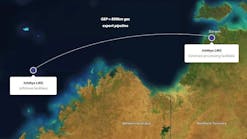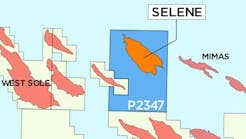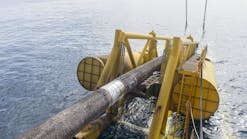US petroleum industry loosing investment capital
due to low profitability of domestic oil & gas operations
Dev George
Managing Editor - International
The money is going elsewhere. Despite the best efforts of US oil and gas companies, the returns on investment (ROI) in the upstream (exploration and production) sector of the US petroleum industry have been, in the words of Salomon Brothers international oil analyst William Randol,"abysmal".
Testifying before the US Senate Committee on Energy & Natural Resources earlier this year, he stated that,"The five-year average ROI for this representative group of seven major oil companies was only 7.3% during the period 1989-93. If Atlantic Richfield is excluded - a company that enjoys a high level of profitability due to its lucrative Alaskan oil production - the five year average ROI for the group of six companies drops to a paltry 6.3%. Three companies in the group failed to earn an average ROI of even 6%: Exxon, Mobil, and Shell at 5.9%, 4.5%, and 3.8%, respectively".Randol cited three reasons for this low level of profitability in US oil and gas operations:
Prospect availability
The US petroleum industry is a mature industry that has exploited the best prospects made available to the oil companies, he said. He noted that the average oil well in the US onshore and offshore produces only 12 b/d oil. In the North Sea, wells that typically produce 5,000 b/d or more are not uncommon.
The Arctic National Wildlife Refuge (ANWR), for example, is believed to contain vast reserves of petroleum. But ANWR isnt the only province that has been off limits to oil and gas exploration for many years.There are other potential oil and gas-bearing regions that have been prohibited for exploration by the companies, primarily in the offshore areas off of both coasts and in some areas of the Gulf of Mexico.
"For these reasons," Randol said, "Foreign earnings for the major oil companies as a percentage of total earnings have swelled to as much as nearly three-quarters of total income for US-based companies like Exxon and Mobil. Foreign-based majors having a significant base of US operations, such as British Petroleum and the Royal Dutch/Shell Group have seen non-US earnings rise to as much as 84% of total operating income."
Foreign capital expenditures as a percentage of total capital spending have also ballooned to over 70% for some of the majors such as BP, Exxon, and Shell, and their foreign net investment in property, plant, and equipment as a percentage of the total shows a substantial growth pattern.
Why is this occurring? Randol says the industry is"allocating capital to the best projects it can find, as it must do in the interest of its shareholders, and these prospects and projects are, sadly, not in the US."
Off limits - keep out
A total of 88 companies participated in the May 10th Central Gulf of Mexico lease sale 152, held in New Orleans. Some 880 bids on 588 tracts were submitted, with high bids totaling more than $307 million.
National Ocean Industries Association President Bob Stewart commented:"It is doubtful industry would have been as willing to commit the millions of dollars offered yesterday for risky and expensive ventures in the deep waters of the Gulf of Mexico"without confidence in the consistency, predictability, and stability of the leasing program. About 31.2 million acres off Louisiana, Mississippi, and Alabama were up for bid. Estimated recoverable hydrocarbons are 110 million bbl oil and 1.06 tcf gas.
Yet what was offered, after all, was but a small fraction of the OCS, perhaps just enough to keep the offshore leasing, exploration, and development program alive in the United States. Beyond this soup(on lies a vast expansion of the US continental shelf encircling the state of Alaska, along the full length of the east and west coast of the United States, and in the eastern half of the Gulf of Mexico that remains off limits to oil companies due to congressional moratoria, leasing deferments, and presidential and governoral withdrawals.
According to the Interstate Oil & Gas Compact Commission, the US has 351 billion bbl of oil in known reserves, but because of these exclusions of the nations most promising prospects, the country is growing dangerously dependent on unstable sources of foreign oil. Furthermore, because such moratoria, a probable 5 tcf gasfield off North Carolinas coast, the biggest offshore gas field in US history, goes unexplored and undeveloped.
California ignored
Within just the federally owned sector of the OCS off California, for example, two bbl of recoverable oil remain for every bbl that has been produced, or about 923 million bbl oil, as well as 1.47 tcf gas. Unproven reserves in some 25 additional fields off California contain an estimated 570 million bbl oil and 679 bcf gas.
Yet Californias Governor Pete Wilson has declared the entire California shelf within three miles of shore off limits to petroleum exploration and production now and forever, extending the presidential withdrawal of the region, which was due to be discontinued after the year 2000.
And in the eastern Gulf of Mexico, from Mobile Bay to the Florida peninsula, natural gas - an environmentally clean product - proliferates within the continental shelf, yet is under congressional moratoria along with oil exploration and production simply because it is a hydrocarbon.
Copyright 1995 Offshore. All Rights Reserved.




